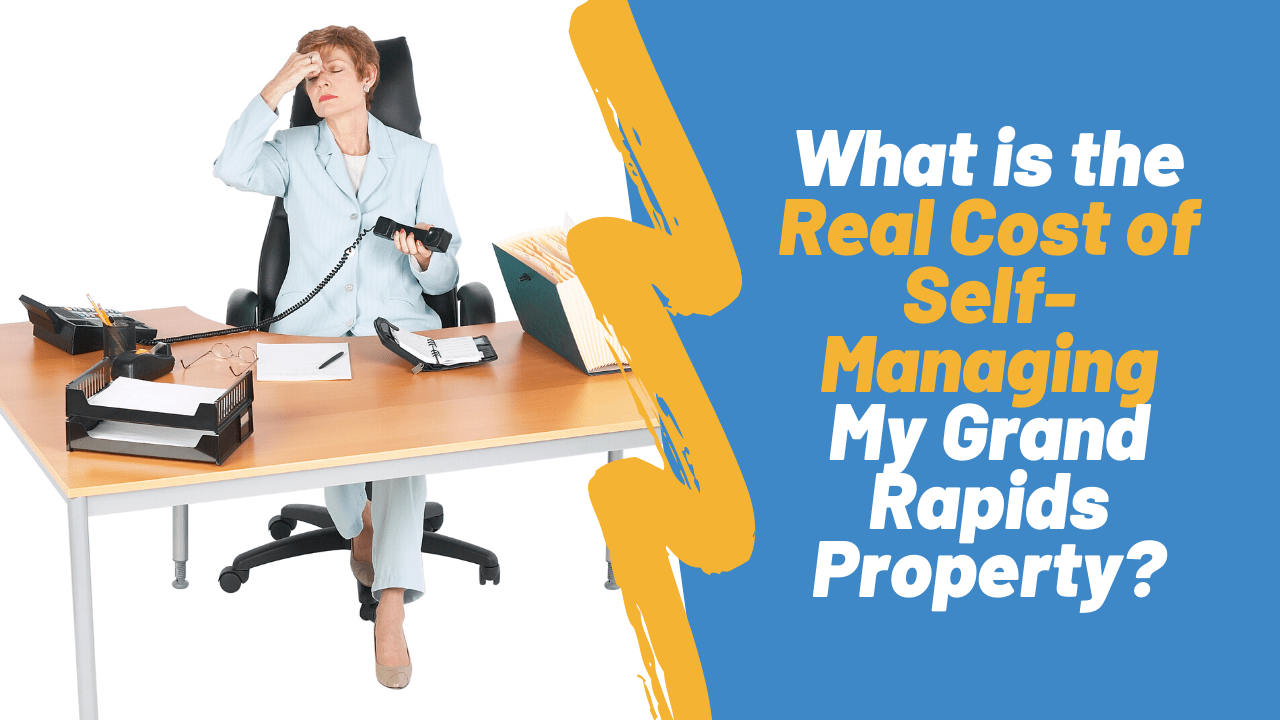
The real cost of self managing a property is time. The number of days that your property is off the market and vacant can add up when you’re doing your own repairs or spending too much time looking for tenants. You can’t recover the rental income that’s lost in that time. You also spend a lot of your own personal time as a self manager, and you may feel like you have nothing to show for it.
The average amount of time a person stays in the property investment business is two or three years. They usually get out after that short period of time because they aren’t making any money. These short term property investors did not calculate the costs at the beginning. In addition to the costs of renting and managing your own property, you have to add in the cost of your time. After two years, if you’re working 10 hours a week and you aren’t being compensated for it, the effort is going to get old.
It’s easy to calculate the return on investment you get on your money. However, it’s hard to take into consideration the return you get on the time you invest. You want to get paid. This is a job. It’s a business. You need to think of yourself as an employee in your business, and you want to get paid for your work and your time. So, the real cost of managing your own property is your time. When you calculate the maintenance costs, the lost rental income and the amount of time you’re spending, you’ll soon realize that managing your own property is a lot more expensive than hiring a professional Grand Rapids property manager.
Another area that costs individual owners is tenant damage. Most owners will not charge their tenants for little things that really add up. For example, a broken blind might cost $5, and owners won’t charge for that when a tenant moves out. However, if there are five blinds that need to be replaced, that cost is $25, and then you might also charge $20 for your time. It’s a common mistake of self management – not collecting on tenant damages.
Finally, the emotional strain can also be a major cost for landlords managing their own property. When someone loses a dog or a job or gets a divorce, it’s easy to feel sorry for that tenant. You might hesitate to evict when rent isn’t being paid. Emotional involvement is not something you can afford, and that’s another area where a professional manager can be a valuable investment.
 Sergio joined United Properties in 2020. He is a graduate from Pickens Technical College as a Nurse Assistant and as a Small Animal Care Provider in 2010. In the past nine years, Sergio has had various jobs, all focused around customer service.
Sergio joined United Properties in 2020. He is a graduate from Pickens Technical College as a Nurse Assistant and as a Small Animal Care Provider in 2010. In the past nine years, Sergio has had various jobs, all focused around customer service. Eden joined United Properties in 2016. Eden graduated from Davenport University in 2015 with an Associate’s in Business Administration. She’s the Executive Assistant to the Owner of United Properties, with a focus on procedural documentation. She enjoys playing guitar, reading, and doing outdoor activities. Eden is trilingual and able to communicate in English, Spanish, and American Sign Language.
Eden joined United Properties in 2016. Eden graduated from Davenport University in 2015 with an Associate’s in Business Administration. She’s the Executive Assistant to the Owner of United Properties, with a focus on procedural documentation. She enjoys playing guitar, reading, and doing outdoor activities. Eden is trilingual and able to communicate in English, Spanish, and American Sign Language.  David joined the United Properties team in 2019 as the Director of Client Relations and Business Development. In this capacity, he is responsible for leading all leasing, application underwriting, tenant relations, accounts receivable, process improvement, remote workers, and general office functionality (essentially anything outside of maintenance and service). David comes from a longstanding career at a Fortune 15 company primarily in a sales and customer service leadership role.
David joined the United Properties team in 2019 as the Director of Client Relations and Business Development. In this capacity, he is responsible for leading all leasing, application underwriting, tenant relations, accounts receivable, process improvement, remote workers, and general office functionality (essentially anything outside of maintenance and service). David comes from a longstanding career at a Fortune 15 company primarily in a sales and customer service leadership role.

 Matthew joined the United Properties in early 2020. He is a graduate of Lee University with a bachelor’s in Intercultural Studies and also a master’s in Discipleship and Christian Formation. Matthew serves as a project manager over the Rent Ready process. He has 20 years of construction experience and over 10 years of experience in leadership positions. He oversees a team of technicians and schedules outside vendors getting properties back to the United rent-ready standard so that they can be leased again.
Matthew joined the United Properties in early 2020. He is a graduate of Lee University with a bachelor’s in Intercultural Studies and also a master’s in Discipleship and Christian Formation. Matthew serves as a project manager over the Rent Ready process. He has 20 years of construction experience and over 10 years of experience in leadership positions. He oversees a team of technicians and schedules outside vendors getting properties back to the United rent-ready standard so that they can be leased again.

 Carla joined United Properties in late 2019 as a billing specialist. Carla ensures invoices are received from contractors and bills them out in a timely fashion.
Carla joined United Properties in late 2019 as a billing specialist. Carla ensures invoices are received from contractors and bills them out in a timely fashion. Cristina joined United Properties as the Accounting and Billing Team Lead in October of 2020. She has experience as a technology professional, an English-Spanish translator, and has worked the past several years as the treasurer of her condominium.
Cristina joined United Properties as the Accounting and Billing Team Lead in October of 2020. She has experience as a technology professional, an English-Spanish translator, and has worked the past several years as the treasurer of her condominium. Rick joined United Properties in 2020 as a Service Coordinator and then later transitioned to the Collections team, where his customer service shines. Rick has an extensive background in customer service and enjoys being able to resolve issues. He and his wife are raising their two kids and in his free time, Rick enjoys making his own homemade jerky.
Rick joined United Properties in 2020 as a Service Coordinator and then later transitioned to the Collections team, where his customer service shines. Rick has an extensive background in customer service and enjoys being able to resolve issues. He and his wife are raising their two kids and in his free time, Rick enjoys making his own homemade jerky. Harriet joined United Properties as a Accounting & Billing Specialist in February of 2021. She has experience as a bookkeeper and a Property Manager for a Real Estate account. She was a working student during her college days. Harriet loves cleaning because she thinks it is therapeutic. She also loves watching series during her free time, and she’s a fur mom of one dog. Her inspiration to work every day is her family.
Harriet joined United Properties as a Accounting & Billing Specialist in February of 2021. She has experience as a bookkeeper and a Property Manager for a Real Estate account. She was a working student during her college days. Harriet loves cleaning because she thinks it is therapeutic. She also loves watching series during her free time, and she’s a fur mom of one dog. Her inspiration to work every day is her family. Diego has an extensive background in customer service and, most recently in Maintenance and
Diego has an extensive background in customer service and, most recently in Maintenance and Paulina joined United in early 2021 as a Leasing Assistant. She has a background studying social work, with several years of experience in customer service. She speaks English and Spanish fluently and loves to learn. Paulina enjoys small road trips and cold, rainy weather. Her dog is her favorite thing in the world.
Paulina joined United in early 2021 as a Leasing Assistant. She has a background studying social work, with several years of experience in customer service. She speaks English and Spanish fluently and loves to learn. Paulina enjoys small road trips and cold, rainy weather. Her dog is her favorite thing in the world.
 Jessica has a Bachelor’s Degree in Financial strategies and public accounting and is studying a masters in Blockchain and Fintech regulation. She has previous experience as a customer service representative. She speaks English and Spanish. She loves taking long walks with her three dogs, hiking and road tripping during the weekends.
Jessica has a Bachelor’s Degree in Financial strategies and public accounting and is studying a masters in Blockchain and Fintech regulation. She has previous experience as a customer service representative. She speaks English and Spanish. She loves taking long walks with her three dogs, hiking and road tripping during the weekends.
 Chris Good is new to the United Properties Team since June 2022 as a Business Development Manager. With years of experience in both the construction industry (Master Electrician) and the Real Estate industry (Broker), he will closely work with new and experienced investors to facilitate their real estate goals.
Chris Good is new to the United Properties Team since June 2022 as a Business Development Manager. With years of experience in both the construction industry (Master Electrician) and the Real Estate industry (Broker), he will closely work with new and experienced investors to facilitate their real estate goals.


 Melba Alvarez
Melba Alvarez Enrique Vergara (Henry)
Enrique Vergara (Henry) Alyssa Conklin
Alyssa Conklin




 Leo Lacson
Leo Lacson